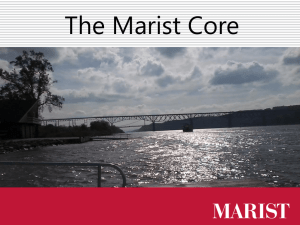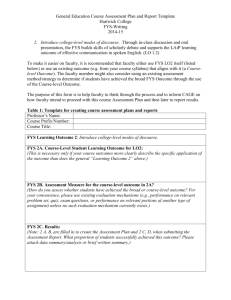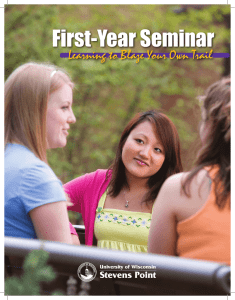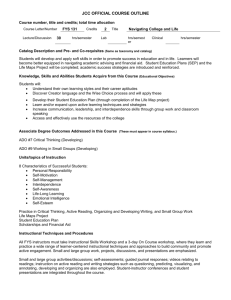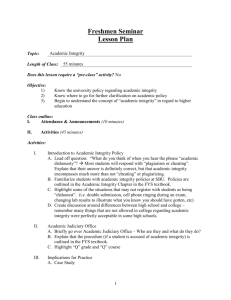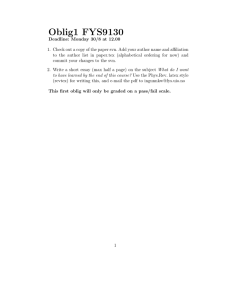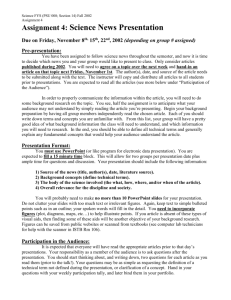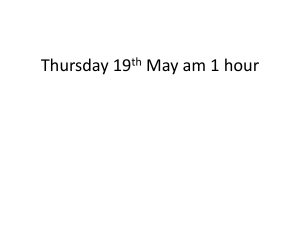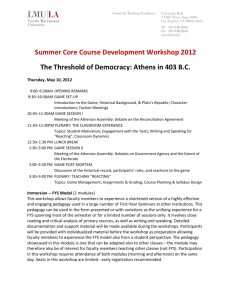Fall 2011 Courses
advertisement
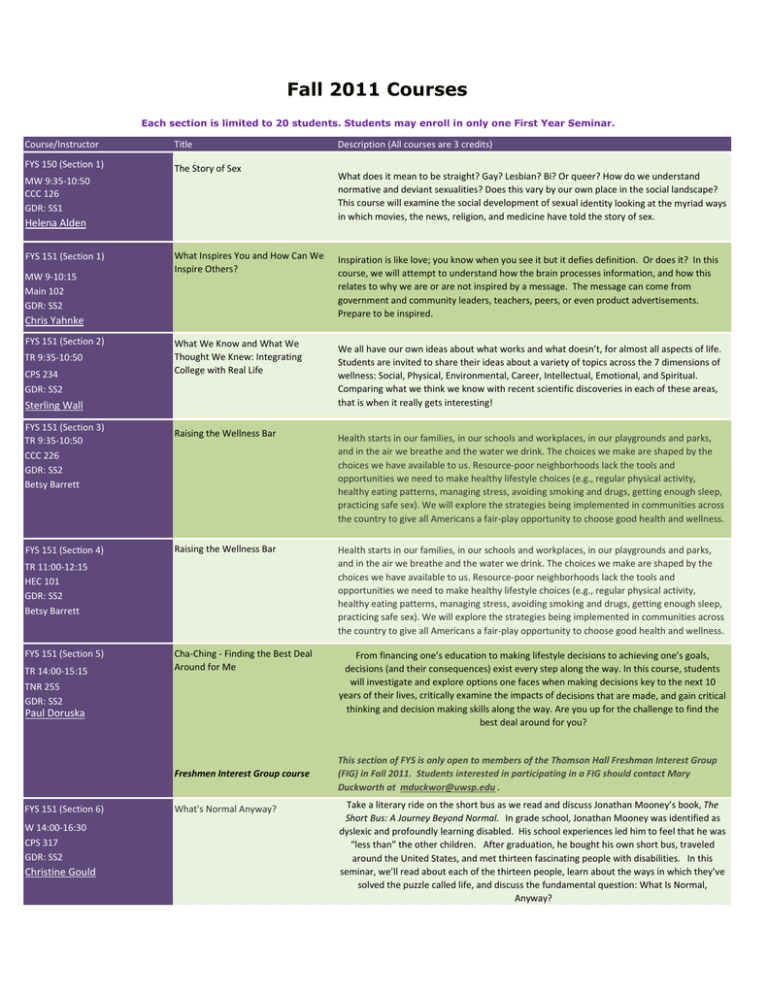
Fall 2011 Courses Each section is limited to 20 students. Students may enroll in only one First Year Seminar. Course/Instructor Title FYS 150 (Section 1) The Story of Sex MW 9:35‐10:50 CCC 126 GDR: SS1 Helena Alden FYS 151 (Section 1) MW 9‐10:15 Main 102 GDR: SS2 hat Inspires You and How Can We W Inspire Others? Chris Yahnke FYS 151 (Section 2) TR 9:35‐10:50 CPS 234 GDR: SS2 hat We Know and What We W Thought We Knew: Integrating College with Real Life Sterling Wall FYS 151 (Section 3) TR 9:35‐10:50 CCC 226 GDR: SS2 Betsy Barrett FYS 151 (Sec on 4) TR 14:00‐15:15 ealth starts in our families, in our schools and workplaces, in our playgrounds and parks, H and in the air we breathe and the water we drink. The choices we make are shaped by the choices we have available to us. Resource‐poor neighborhoods lack the tools and opportunities we need to make healthy lifestyle choices (e.g., regular physical activity, healthy eating patterns, managing stress, avoiding smoking and drugs, getting enough sleep, practicing safe sex). We will explore the strategies being implemented in communities across the country to give all Americans a fair‐play opportunity to choose good health and wellness. Cha‐Ching ‐ Finding the Best Deal Around for Me From financing one’s education to making lifestyle decisions to achieving one’s goals, decisions (and their consequences) exist every step along the way. In this course, students will investigate and explore options one faces when making decisions key to the next 10 years of their lives, critically examine the impacts of decisions that are made, and gain critical thinking and decision making skills along the way. Are you up for the challenge to find the best deal around for you? Freshmen Interest Group course Christine Gould e all have our own ideas about what works and what doesn’t, for almost all aspects of life. W Students are invited to share their ideas about a variety of topics across the 7 dimensions of wellness: Social, Physical, Environmental, Career, Intellectual, Emotional, and Spiritual. Comparing what we think we know with recent scientific discoveries in each of these areas, that is when it really gets interesting! Raising the Wellness Bar Paul Doruska W 14:00‐16:30 CPS 317 GDR: SS2 I nspiration is like love; you know when you see it but it defies definition. Or does it? In this course, we will attempt to understand how the brain processes information, and how this relates to why we are or are not inspired by a message. The message can come from government and community leaders, teachers, peers, or even product advertisements. Prepare to be inspired. ealth starts in our families, in our schools and workplaces, in our playgrounds and parks, H and in the air we breathe and the water we drink. The choices we make are shaped by the choices we have available to us. Resource‐poor neighborhoods lack the tools and opportunities we need to make healthy lifestyle choices (e.g., regular physical activity, healthy eating patterns, managing stress, avoiding smoking and drugs, getting enough sleep, practicing safe sex). We will explore the strategies being implemented in communities across the country to give all Americans a fair‐play opportunity to choose good health and wellness. TNR 255 GDR: SS2 FYS 151 (Section 6) What does it mean to be straight? Gay? Lesbian? Bi? Or queer? How do we understand normative and deviant sexualities? Does this vary by our own place in the social landscape? This course will examine the social development of sexual identity looking at the myriad ways in which movies, the news, religion, and medicine have told the story of sex. Raising the Wellness Bar TR 11:00‐12:15 HEC 101 GDR: SS2 Betsy Barrett FYS 151 (Section 5) Description (All courses are 3 credits) What's Normal Anyway? This section of FYS is only open to members of the Thomson Hall Freshman Interest Group (FIG) in Fall 2011. Students interested in participating in a FIG should contact Mary Duckworth at mduckwor@uwsp.edu . Take a literary ride on the short bus as we read and discuss Jonathan Mooney’s book, The Short Bus: A Journey Beyond Normal. In grade school, Jonathan Mooney was identified as dyslexic and profoundly learning disabled. His school experiences led him to feel that he was “less than” the other children. After graduation, he bought his own short bus, traveled around the United States, and met thirteen fascinating people with disabilities. In this seminar, we’ll read about each of the thirteen people, learn about the ways in which they’ve solved the puzzle called life, and discuss the fundamental question: What Is Normal, Anyway? FYS 151 (Section 7) MW 15:35‐16:50 CAC 237 GDR: SS2 The Language of Medicine and the Medicine of Language Timothy Halkowski FYS 151 (Section 8) TR 15:35‐16:50 LRC 310 GDR: SS2 Y our Past Before Your Eyes, Your Future In The Making Axel Schmetzke FYS 152 (Section 1) MWF 13‐13:50 SCI A109 GDR: NS* This Old House: The Science of Your House How do people talk about symptoms, diagnoses, tobacco and alcohol use, diet and exercise? How does medical language help to ease a patient’s problem (or worsen it)? Drawing from medical discourse research (as well as poetry and theatre), we will discover how people use stories in medical settings, and what they use those stories to do. hat is your family history? What educational choices did your ancestors make, and why? To W which extent may social, economic, political and cultural conditions have influenced their choices? After exploring these questions, students will reflect on their own circumstances, learn more about the opportunities available to them at UWSP, and plot a tentative educational course for the next four years and beyond. How does your house work? Find out why architecture stands up, how the electrical, heating, and cooling systems function, what the traditional and alternative sources of energy are, and why the cool gadgets in your house work. Brad Hinaus FYS 153 (Section 1) T 8:00‐10:30 NFAC 126 GDR: HU1 Make Your Own Cultural Crafts Anne‐Bridget Gary FYS 153 (Section 3) A Culinary Memoir “ Tell me what you eat, and I’ll tell you who you are.” We will explore the United States’ great diversity of culinary traditions from Texas chili parlors to Main clam bakes, from Gullah rice to Kansas City BBQ, from Cajun gumbo to fried candy bars at Minnesota state fairs. We will use these explorations to analyze relationships between food, culture and identity. We will learn about the culinary memoir, a form of autobiographical nonfiction that tells life stories through food. Finally, we will write our own culinary life stories, putting to the test that famous dictum, “we are what we eat.” TR 14:00‐15:15 CAC 202 GDR: HU1 Elizabeth Fakazis Freshmen Interest Group course FYS 153 (Section 4) TR 12:35‐13:50 CPS 210 GDR: HU1 Steve Seiler FYS 154 (Section 1) MW 9:35‐10:50 CCC 320 GDR: HU2 Mary Bowman This section of FYS is only open to members of the Hansen Hall Freshman Interest Group (FIG) in Fall 2011. Students interested in participating in a FIG should contact Mary Duckworth at mduckwor@uwsp.edu . Technique and Persuasion in Documentary Film nalyze some of the top rated documentaries of all me to learn how filmmakers cap vate A (and perhaps motivate) their audiences. We will view films that illustrate diverse approaches to filming and discuss how these approaches can help tell stories or distract from them. In addition to discussing and reflecting on the films, we will pursue fact‐finding research This class has been canceled. projects to evaluate their broader impact. A Literary Journey into Cultural Divides Cheryl Brickner FYS 154 (Section 2) MWF 11:00‐11:50 CCC 106 GDR: HU2 Can you weave a tapestry? Create a loom? Make pottery? Have you ever wanted to learn? This course will emphasize craft‐arts in their cultural context from around world. You will be engaged by examples of Hmong Tapestries, Chinese calligraphy, the Japanese Tea Ceremony and Pueblo pottery. You will have hands on experiences with materials such as wool and clay and work with others to create costuming and artifacts. From Private Obsession to Global Phenomenon: The Story of The Lord of the Rings here do preconceived ideas about cultural differences come from? Through various forms W of literature this course will examine the force of society which oppresses “the other” and in turn creates cultural divides. We will study cultural divides from the mid‐twentieth century to the present, focusing on the Holocaust, the African American and Hispanic American experience, and the Afghan culture in contemporary America. You’ve probably seen the movies. You may have read the books. But do you know whereThe Lord of the Rings originated? Have you ever thought of Tolkien as an environmentalist? Or The Lord of the Rings as “profoundly Christian”? (as Tolkien considered it.) Would you be surprised to know to that some scientists study and teach his work? Come learn how Tolkien’s personal life and professional career shaped his fiction, explore the complex world he created, and consider the effects of translating his work to the medium of film. FYS 154 (Section 3) MWF 12:00‐12:50 CCC 106 GDR: HU2 F rom Private Obsession to Global Phenomenon: The Story of The Lord of the Rings Mary Bowman FYS 154 (Section 4) TR 14:00‐15:15 CCC 226 GDR: HU2 Liberal Arts in the Digital Age Rebecca Stephens FYS 156 (Section 1) MWF 10:00‐10:50 CCC 204 Lab: R 17:30‐19:30 CCC 303 GDR: BSHI and NW Witches, Werewolves, and Vampires Brian Hale FYS 156 (Section 2) MWF 13:00‐13:50 CCC 224 Lab: R 17:30‐19:30 CCC 303 GDR: BSHI and NW Witches, Werewolves, and Vampires Brian Hale FYS 157 (Section 1) TR 11:00‐12:15 CCC 231 GDR: BSHI and MNS rawing Lines, Crossing Lines: D Histories of American Borderlands Rob Harper FYS 159 (Section 3) TR 14:00‐15:15 HEC 119 GDR: HU3 Philosophy and Popular Culture Karin Fry FYS 159 (Section 4) TR 15:35‐16:50 HEC 119 GDR: HU3 Philosophy and Popular Culture Karin Fry This section has been canceled. FYS 161 (Section 1) MW 9:35‐10:50 CCC 231 GDR: BSHI, NW, and EL Francis Dube Environmental Disasters Y ou’ve probably seen the movies. You may have read the books. But do you know whereThe Lord of the Rings originated? Have you ever thought of Tolkien as an environmentalist? Or The Lord of the Rings as “profoundly Christian”? (as Tolkien considered it.) Would you be surprised to know to that some scientists study and teach his work? Come learn how Tolkien’s personal life and professional career shaped his fiction, explore the complex world he created, and consider the effects of translating his work to the medium of film. Does Facebook alter your brain? Some argue that it not only changes the way that we think, but also that the digital technologies around us every day are threatening our American democracy, while others believe that these technologies are actually making us smarter. This course will ask you to explore the meaning of a liberal arts degree for your generation, and offer opportunities to explore what it means to be an individual, what it means to be engaged in a community, and what it means to be educated. This course will begin with an examination of witches, werewolves, and vampires in Europe from ancient times to the twenty‐first century in art, film, literature, music, theater, secondary works and written sources. It will conclude with an investigation of witches, werewolves, and vampires in other cultures, including China, Sub‐Sahara Africa, and the Americas. At the end of the semester, students will have achieved a greater understanding of the “other” over time in a variety of cultures and societies. This course will begin with an examination of witches, werewolves, and vampires in Europe from ancient times to the twenty‐first century in art, film, literature, music, theater, secondary works and written sources. It will conclude with an investigation of witches, werewolves, and vampires in other cultures, including China, Sub‐Sahara Africa, and the Americas. At the end of the semester, students will have achieved a greater understanding of the “other” over time in a variety of cultures and societies olitical, social, and cultural boundaries have shaped Americans’ lives for centuries. Where P did these lines come from? How have they influenced American communities? And how have they changed over time? We will explore boundary‐making and boundary‐crossing from the time of Columbus through today’s debates over trade, immigration, and homeland security. E xplore the history of ideas through popular culture, from Socrates to South Park, from Husserl to Harry Potter, and everywhere in between. Using examples from popular films, music, television, and the internet, we will explore age‐old questions about the meaning of life, the importance of art, the tension between logic and emotion, as well as religion, science, politics and morality. Through viewing various media, discussing particular philosophical topics, and using them as a touchstone we will trigger discussions concerning the college experience and how it may differ from high school. Explore the history of ideas through popular culture, from Socrates to South Park, from Husserl to Harry Potter, and everywhere in between. Using examples from popular films, music, television, and the internet, we will explore age‐old questions about the meaning of life, the importance of art, the tension between logic and emotion, as well as religion, science, politics and morality. Through viewing various media, discussing particular philosophical topics, and using them as a touchstone we will trigger discussions concerning the college experience and how it may differ from high school. From hurricane Katrina to the recent oil spill in the Gulf of Mexico, environmental disasters have affected us all. We will look at the causes of environmental disasters, how people around the world have tried to prevent and mitigate environmental disasters, and how disasters have shaped history. By critically analyzing past disasters, students will encounter new ways of understanding, dealing with, and finding solutions for future ones. FYS 162 (Section 1) TR 8:00‐9:15 CCPS326 GDR: HU1 and NW T he World is Your Classroom‐‐So Travel! “ The world is a book, and those who do not travel read only a page.” ‐ St. Augustine. Come explore a variety of ways to travel and learn in an international, global context (as a student, volunteer, or professional) and plan out several options for your own travels (based on time and budget). A virtual tour of the world highlighting several unique places will help you discuss and prepare for your own personal journey. Modern and ancient architecture, cultural and social aspects, and activities of a variety of cities (Western and Non‐Western) will be examined. This course will inspire you to follow Mark Twain’s advice on travel. “Twenty years from now you will be more disappointed by the things you didn’t do than by the ones you did do. So throw off the bowlines, sail away from the safe harbor. Catch the trade winds in your sails. Explore, Dream, Discover.” The World is Your Classroom‐‐So Travel! “The world is a book, and those who do not travel read only a page.” ‐ St. Augustine. Come explore a variety of ways to travel and learn in an international, global context (as a student, volunteer, or professional) and plan out several options for your own travels (based on time and budget). A virtual tour of the world highlighting several unique places will help you discuss and prepare for your own personal journey. Modern and ancient architecture, cultural and social aspects, and activities of a variety of cities (Western and Non‐Western) will be examined. This course will inspire you to follow Mark Twain’s advice on travel. “Twenty years from now you will be more disappointed by the things you didn’t do than by the ones you did do. So throw off the bowlines, sail away from the safe harbor. Catch the trade winds in your sails. Explore, Dream, Discover.” Kathe Julin FYS 162 (Section 2) TR 9:35‐10:50 CPS 304 GDR: HU1 and NW Kathe Julin FYS 163 (Section 1) TR 15:35‐16:50 CCC 231 GDR: BSHI and HU4 Sarah Kent Anatomy of Auschwitz How and why do episodes of mass violence occur? How can seemingly ordinary people commit mass murder, and why don’t the victims appear to fight back? We will examine such questions through the focal point of Auschwitz, the central death camp in the Nazi concentration camp universe. You will explore Auschwitz through a wide variety of on‐line and print materials from art, biology, film, human geography, history, journalism, literature, music, photography, psychology, and religious studies. *Because this course has no lab component, it will not satisfy the Natural Science requirment for students pursuing a Bachelor of Arts degree.
